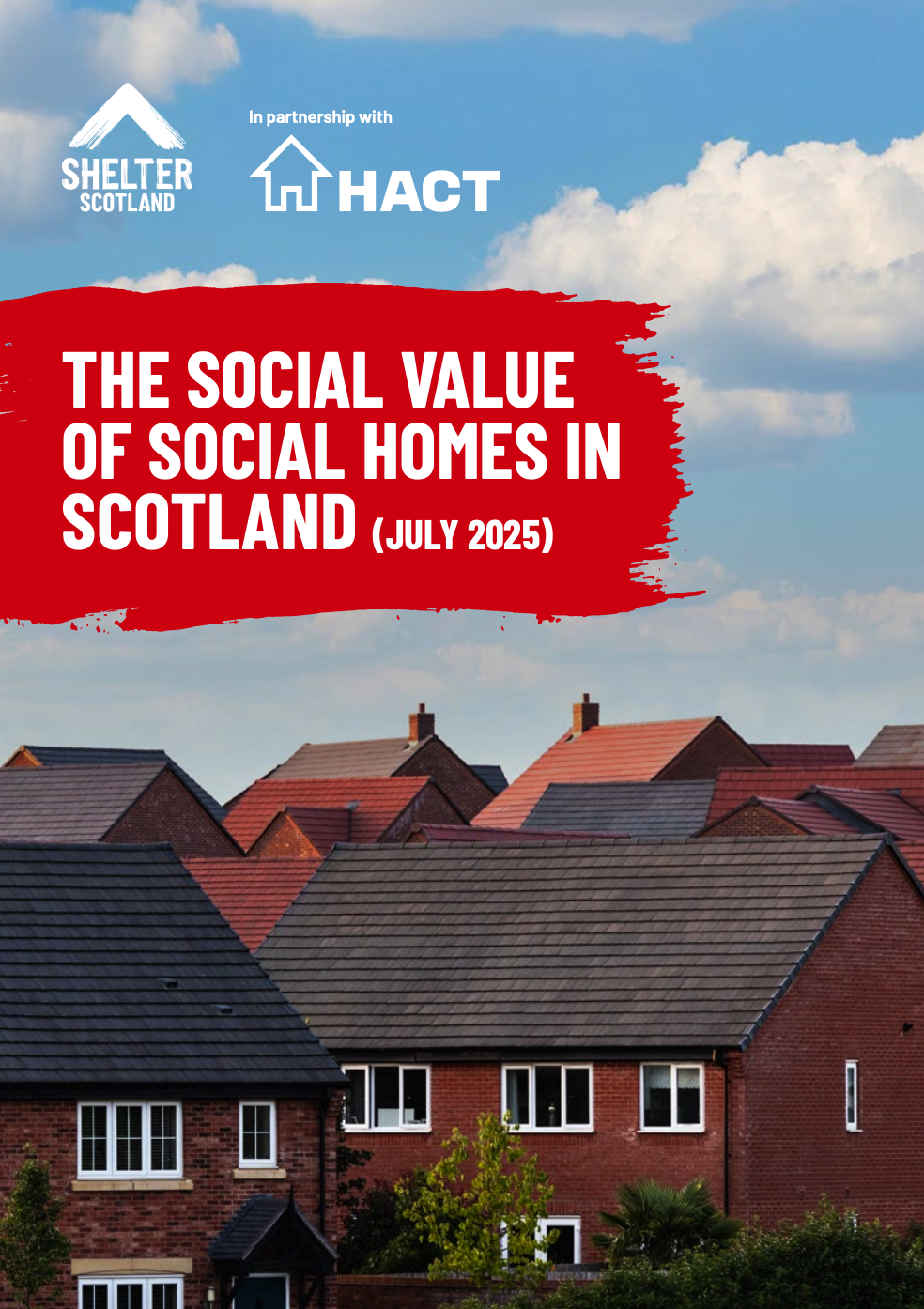New HACT research highlights life-changing value of social housing

New social tenancies can generate a value of £11,639, a new three-year study commissioned by Shelter Scotland has found.
The study, published today, was led by Housing Associations’ Charitable Trust (HACT), which worked with tenants and social housing providers over three years to measure how securing a social tenancy has transformed households’ health, wellbeing, and life circumstances, such as economic and employment status.
By applying the UK Social Value Bank model, the study calculated that each new social tenancy in Scotland can generate on average £11,639 in social value within just six months of a tenant moving in. This figure includes a £990.44 saving to the public purse and £10,648 in wellbeing value to the tenant, who benefits from improved opportunities such as securing employment, better health, transport connections, and reduced housing costs, thanks to their new social home.
But despite this clear benefit, figures published in June by the Scottish Government showed social house building was at its lowest level in a decade.
Shelter Scotland warned that the continued decline in social housing delivery was an inevitable consequence of repeated budget cuts and decades of underinvestment.
Alison Watson, director of Shelter Scotland, said: “As 2.3 million adults in Scotland are impacted by the housing emergency, we know social homes provide security, affordability and stability, resulting in positive social, economic and health outcomes. In turn, the cost to the public purse of the negative consequence of poor housing is reduced. This is why the next government need to make social housing a priority.
“Investing in social housing means investing in people’s health and in our communities. Delivering more social housing is the only way to get the 10,360 children in Scotland out of temporary accommodation and into forever homes. So, ultimately, investing in social homes is also investing in Scotland’s future.”
Frances Harkin, HACT Head of Services, added: “Social housing services in Scotland are seeing higher demand than ever before. However, there’s a real gap in understanding the impacts of providing suitable, quality and affordable housing and the wrap-around services provided by social landlords.
“Social housing tenancies are driving improvements in social, economic and health outcomes in residents, and where these are achieved there is huge capacity for significant preventative savings to wider society.
“We’re delighted to partner with Shelter Scotland to measure the tangible benefits of social housing, particularly the impact of new tenancies. This research is crucial in demonstrating its true value and ensuring it informs strategy and decision-making moving forward.”
Dawn Chambers, tenancy sustainment coordinator at Osprey Housing, commented: “Osprey Housing are incredibly proud to have partnered with Shelter Scotland and HACT on a vital project that underscores the positive impact of well-designed social housing with access to green spaces. This collaboration has allowed us to shine a light on the tangible, positive changes experienced by our tenants in our newest developments.
“The project has demonstrated how thoughtful planning, integrating easy access to green spaces, significantly enhances the well-being and quality of life for residents. We’ve heard firsthand how these environments foster stronger communities, improve mental and physical health, and provide a sense of belonging for our tenants.
“Working alongside Shelter Scotland and HACT has been an immensely rewarding experience. We are committed to continuing our efforts to provide homes that not only offer shelter but also enrich the lives of the people who live in them. This initiative reinforces our belief that housing is more than just bricks and mortar; it’s about creating thriving, sustainable communities where everyone can flourish.”
Kirstylee’s story
Kirstylee Murray (35) currently lives in a three-bed council flat on the second floor with her husband and three children. While the flat has helped improve her mental health, it’s still not suitable for her 10-year-old son, who has an autistic spectrum condition and polyarticular juvenile idiopathic arthritis, a rare auto immune disease which impacts his mobility.
She said: “Since moving into this flat, my mental health has improved so much. It’s in the south side of Aberdeen (Deeside) and it’s near our family and support network.
“There are pros and cons to living here but it really is one of the best places I’ve lived. Having that sense of home and belonging is massively important for your mental health. My quality of life has improved too.
“We’re looking for somewhere more accessible for my son, and we’ve been told we need a four-bed with no stairs due to his needs. With his mobility, he is still in pain. There are some good days and bad days. But if we could get somewhere without those stairs, it would make the world of difference. Not just to him, but to the whole family. I used to have to carry him up 44 steps each day, now it’s maybe once every fortnight. I keep being told we’re in a housing emergency, and I can feel it. But there are just simply not enough council homes.”







